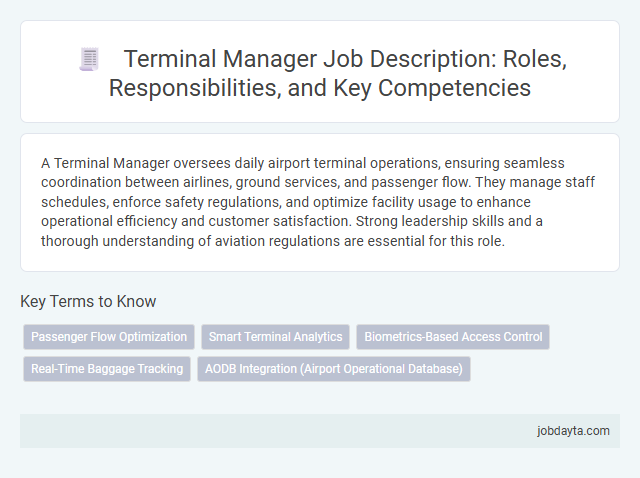A Terminal Manager oversees daily airport terminal operations, ensuring seamless coordination between airlines, ground services, and passenger flow. They manage staff schedules, enforce safety regulations, and optimize facility usage to enhance operational efficiency and customer satisfaction. Strong leadership skills and a thorough understanding of aviation regulations are essential for this role.
Overview of a Terminal Manager in Aviation
A Terminal Manager in aviation oversees the daily operations of airport terminals, ensuring smooth passenger flow and efficient facility management. This role requires coordinating multiple teams to maintain safety, security, and customer service standards.
Your responsibility as a Terminal Manager includes optimizing terminal logistics and addressing any operational challenges promptly. Effective communication and leadership skills are essential to manage staff and collaborate with airlines, security, and ground services.
Key Roles and Responsibilities of a Terminal Manager
The Terminal Manager plays a vital role in the efficient operation of airport terminals. Their leadership ensures smooth passenger flow, safety, and compliance with aviation regulations.
- Operations Supervision - Oversee daily terminal activities to maintain optimal service levels and operational efficiency.
- Staff Management - Lead and coordinate terminal staff, including security, customer service, and maintenance teams.
- Regulatory Compliance - Ensure all terminal operations comply with aviation safety standards and government regulations.
Essential Skills and Competencies for Terminal Managers
Terminal managers play a crucial role in overseeing airport operations, ensuring efficient passenger flow and cargo handling. Mastery of logistical coordination and team leadership forms the foundation of their responsibilities.
Essential skills for terminal managers include strong communication abilities to liaise with airlines, security personnel, and ground staff effectively. Competency in crisis management allows rapid response to emergencies, minimizing disruptions. Proficiency in technology, such as terminal management systems and data analytics, enhances operational efficiency and decision-making accuracy.
Daily Operations Managed by an Aviation Terminal Manager
What are the key daily operations managed by an aviation terminal manager? An aviation terminal manager oversees passenger flow, baggage handling, and coordination with airline staff to ensure efficient terminal functioning. They also monitor facility maintenance, security protocols, and respond to operational disruptions to maintain safety and service quality.
Leadership and Team Management in Terminal Operations
Effective leadership in aviation terminal operations ensures seamless coordination and enhances passenger experience. Your role as a Terminal Manager demands strong team management skills to drive operational excellence and safety compliance.
- Strategic Direction - Setting clear goals aligns team efforts with airport operational objectives for maximum efficiency.
- Communication Skills - Facilitating open, precise communication fosters collaboration and quick problem-solving among staff.
- Performance Monitoring - Regularly assessing team performance identifies areas for improvement and reinforces accountability in terminal operations.
Safety and Compliance Responsibilities in Aviation Terminals
The Terminal Manager ensures strict adherence to aviation safety regulations and industry standards within airport terminals. This role involves overseeing compliance with security protocols, emergency procedures, and operational guidelines to protect passengers and staff. Regular audits and training programs are conducted to maintain a safe and efficient terminal environment.
Coordination with Airlines and Ground Handling Services
The Terminal Manager plays a crucial role in coordinating operations between airlines and ground handling services to ensure seamless passenger flow and efficient aircraft turnaround. Effective communication with airlines facilitates real-time updates on flight schedules and passenger requirements, minimizing delays.
Collaboration with ground handling teams is essential for managing baggage handling, catering, and aircraft servicing within tight timeframes. The Terminal Manager oversees these interactions to maintain operational consistency and enhance overall airport performance.
Challenges Faced by Terminal Managers and Solutions
Terminal managers in aviation face complex challenges that impact airport operations and passenger experience. Effective management requires addressing congestion, security, and resource allocation to maintain smooth terminal functioning.
- Managing Passenger Flow - Terminal managers must optimize passenger movement to reduce overcrowding and ensure timely boarding processes.
- Security Compliance - Ensuring adherence to stringent aviation security regulations while maintaining efficient operations is a critical challenge.
- Resource Coordination - Coordinating staff, equipment, and gate availability demands strategic planning to avoid operational disruptions.
Innovative technologies and process improvements offer practical solutions to overcome these operational challenges in aviation terminals.
Educational and Professional Requirements for Terminal Managers
| Aspect | Details |
|---|---|
| Educational Requirements |
|
| Professional Requirements |
|
Career Growth and Advancement Opportunities in Aviation Terminal Management
Terminal Manager roles in aviation provide dynamic career growth through overseeing airport terminal operations and enhancing passenger experiences. Advancing in this field involves gaining expertise in logistics, safety compliance, and team leadership, which opens doors to senior management positions. Your skills in managing complex terminal activities position you for continued professional development and higher responsibility within the aviation industry.
Related Important Terms
Passenger Flow Optimization
Terminal Managers utilize advanced data analytics and passenger tracking technologies to optimize passenger flow, reducing dwell times and preventing congestion. Implementing real-time monitoring systems and dynamic resource allocation enhances operational efficiency and improves overall traveler experience at busy airport terminals.
Smart Terminal Analytics
Smart Terminal Analytics empowers Terminal Managers to optimize airport operations through real-time data insights, enhancing passenger flow management and resource allocation. Advanced analytics tools enable proactive decision-making, reducing delays and improving terminal efficiency while boosting overall passenger experience.
Biometrics-Based Access Control
Terminal Managers implement biometrics-based access control systems to enhance security and streamline passenger flow by using fingerprint, facial recognition, and iris scanning technologies. These advanced identification methods reduce unauthorized access risks and improve operational efficiency within airport terminals.
Real-Time Baggage Tracking
Terminal Managers enhance operational efficiency by utilizing real-time baggage tracking systems, which enable precise monitoring of luggage locations throughout the airport. This technology reduces mishandling, speeds up baggage transfer, and improves passenger satisfaction by providing accurate updates on baggage status.
AODB Integration (Airport Operational Database)
Terminal Managers optimize airport operations by leveraging AODB integration to streamline flight schedules, gate assignments, and resource allocation. Real-time data synchronization with the Airport Operational Database enhances decision-making, minimizes delays, and improves passenger flow efficiency.
Terminal Manager Infographic

 jobdayta.com
jobdayta.com